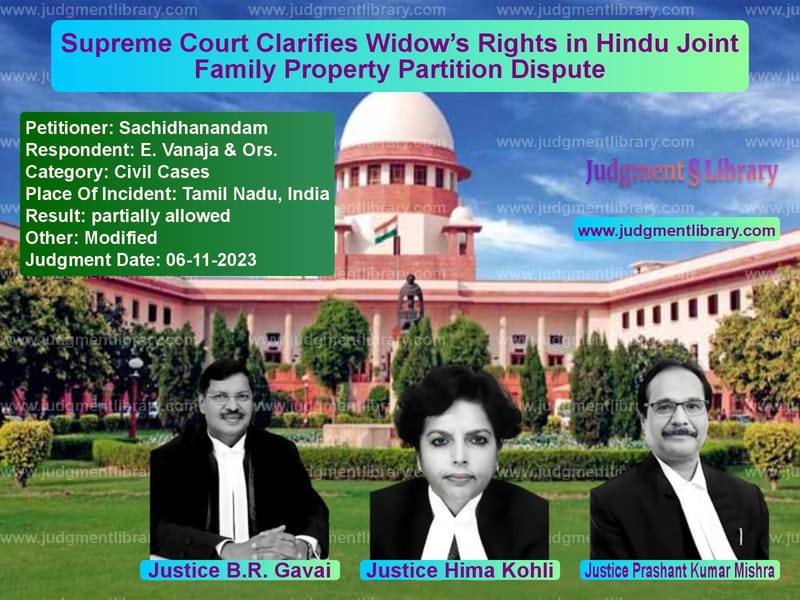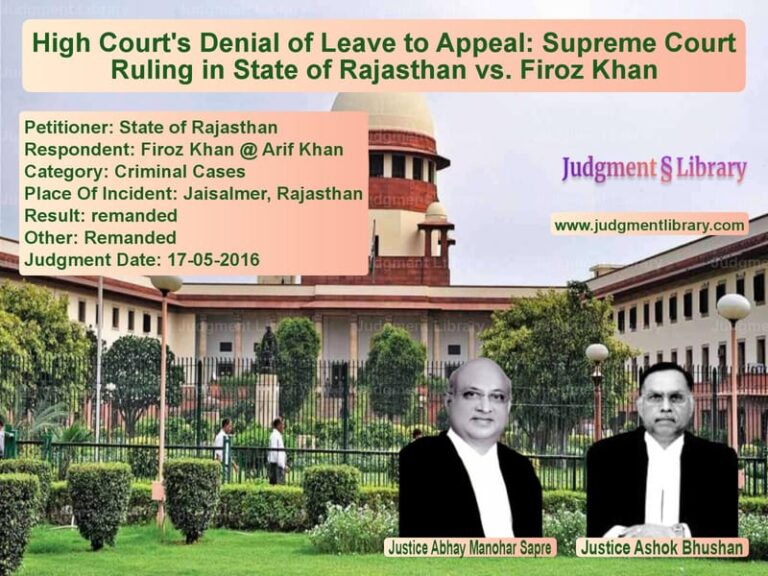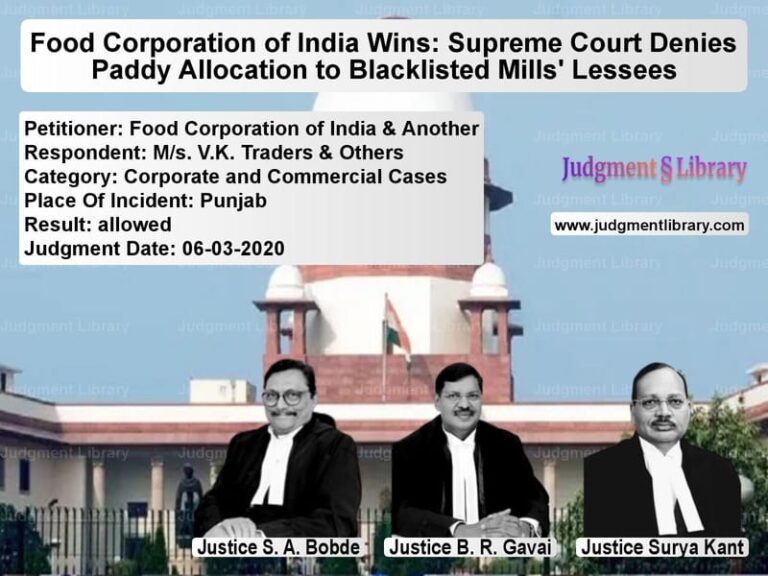Supreme Court Clarifies Widow’s Rights in Hindu Joint Family Property Partition Dispute
The case of Sachidhanandam vs. E. Vanaja & Ors. is a landmark judgment that examines the inheritance rights of widows in Hindu joint family properties. The Supreme Court was called upon to determine whether a widow of a pre-deceased son had a rightful claim to her mother-in-law’s share in an ancestral property partition. The Court analyzed the provisions of the Hindu Succession Act, 1956, and clarified that a widow’s right extends only to her husband’s share and does not automatically include property inherited by her mother-in-law.
Background of the Case
The dispute arose from a partition suit filed by E. Vanaja, the widow of Elangovan. She sought a partition and separate possession of joint family properties, which included Schedules B, C, and C1 properties. The suit was contested by other family members, including Sachidhanandam, the appellant, who argued that the widow was not entitled to a share in her late mother-in-law’s property.
The trial court ruled in favor of the plaintiff, granting her a 1/8th share in the joint family properties. However, upon appeal, the First Appellate Court reduced her entitlement to 1/16th share in Schedule B and C1 properties while denying her claim over Schedule C properties.
The Madras High Court then heard the matter and ruled that since the plaintiff’s husband and mother-in-law had both passed away, the widow should be entitled to a 1/7th share in the entire joint family property. This decision was challenged in the Supreme Court by the appellant.
Petitioner’s Arguments
The appellant, Sachidhanandam, contended:
- The Hindu Succession Act does not provide for a widow to inherit property from her mother-in-law unless explicitly mentioned in the law.
- The High Court had misinterpreted succession laws by granting the widow a share in her mother-in-law’s estate.
- The properties in question were ancestral and should be distributed strictly among the direct heirs as per Hindu law.
- The widow’s claim was limited to her husband’s share and should not extend beyond that.
Respondent’s Arguments
The plaintiff, E. Vanaja, countered:
- She was the sole legal heir of her deceased husband and, as per succession laws, was entitled to inherit his share.
- Under Hindu law, widows have the right to seek partition of joint family properties, and she was exercising this right.
- The High Court had correctly granted her a share considering the deaths of her husband and mother-in-law.
Key Legal Issues Considered
1. Whether a Widow Can Inherit Her Mother-in-Law’s Property Under Hindu Succession Law
The Supreme Court examined whether a widow of a pre-deceased son had the right to claim her mother-in-law’s inherited property in a joint family setting.
2. Interpretation of Sections 15 and 16 of the Hindu Succession Act
The Court analyzed whether a mother-in-law’s property should pass to her direct heirs (children and husband) or whether it could be claimed by the widow of a pre-deceased son.
3. Correct Calculation of the Widow’s Share
The Supreme Court scrutinized whether the High Court correctly calculated the widow’s entitlement to 1/7th share in the property.
Supreme Court’s Verdict
The Supreme Court ruled in favor of modifying the High Court’s decision and made the following observations:
- The plaintiff was entitled to inherit only her husband’s share, not her mother-in-law’s share.
- Under Sections 15 and 16 of the Hindu Succession Act, a mother-in-law’s property cannot pass to the widow of a pre-deceased son unless explicitly stated in a will.
- The High Court’s decision was incorrect in granting the plaintiff a share in her mother-in-law’s estate.
- The correct share for the plaintiff was 1/16th in Schedule B and C1 properties, as determined by the First Appellate Court.
Key Takeaways from the Judgment
- Widows Do Not Automatically Inherit From Their Mother-in-Law: Hindu succession law prioritizes direct heirs over widows of pre-deceased sons.
- Strict Interpretation of Succession Laws: The Court reinforced that inheritance laws should be applied precisely without misinterpretation.
- Partition Cases Must Be Carefully Calculated: The judgment emphasized the importance of accurate share calculations in joint family properties.
- Supreme Court’s Role in Correcting Lower Court Errors: The ruling rectified an error in the High Court’s share calculation.
This ruling clarifies inheritance rights under Hindu law, particularly in joint family property disputes involving widows of pre-deceased sons.
Petitioner Name: Sachidhanandam.Respondent Name: E. Vanaja & Ors..Judgment By: Justice B.R. Gavai, Justice Hima Kohli, Justice Prashant Kumar Mishra.Place Of Incident: Tamil Nadu, India.Judgment Date: 06-11-2023.
Don’t miss out on the full details! Download the complete judgment in PDF format below and gain valuable insights instantly!
Download Judgment: sachidhanandam-vs-e.-vanaja-&-ors.-supreme-court-of-india-judgment-dated-06-11-2023.pdf
Directly Download Judgment: Directly download this Judgment
See all petitions in Succession and Wills
See all petitions in Landlord-Tenant Disputes
See all petitions in Judgment by B R Gavai
See all petitions in Judgment by Hima Kohli
See all petitions in Judgment by Prashant Kumar Mishra
See all petitions in partially allowed
See all petitions in Modified
See all petitions in supreme court of India judgments November 2023
See all petitions in 2023 judgments
See all posts in Civil Cases Category
See all allowed petitions in Civil Cases Category
See all Dismissed petitions in Civil Cases Category
See all partially allowed petitions in Civil Cases Category







